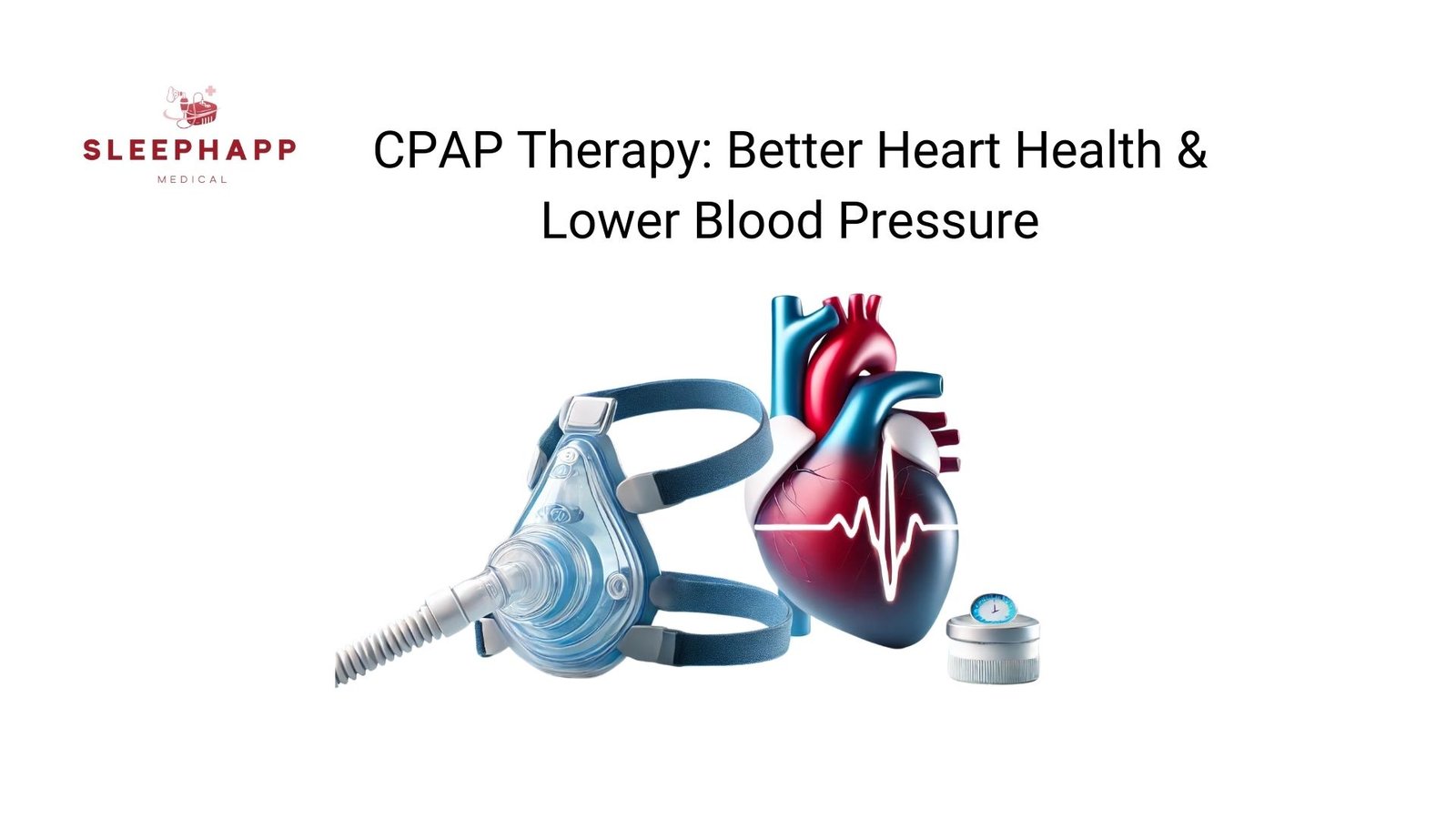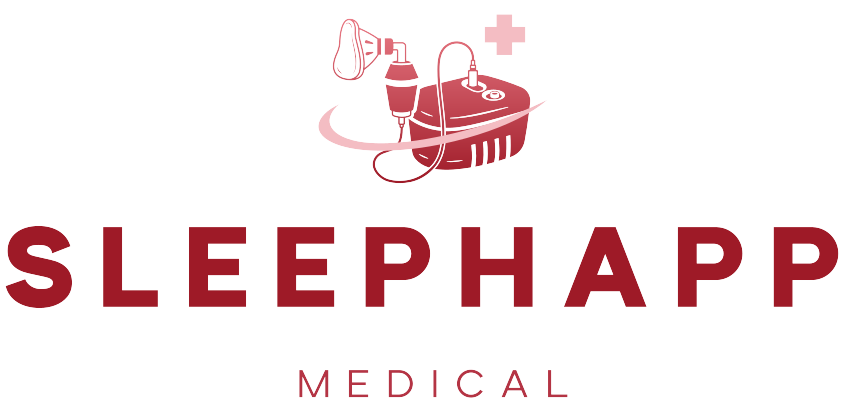How CPAP Therapy Can Improve Heart Health and Reduce Blood Pressure
Home » How CPAP Therapy Can Improve Heart Health and Reduce Blood Pressure

Table of Contents
CPAP (Continuous Positive Airway Pressure) therapy is a common treatment for sleep apnea. Sleep apnea is a condition where breathing stops during sleep for short periods. These pauses can last a few seconds or minutes. They can disrupt sleep and cause health problems.
Untreated sleep apnea can harm the heart and raise blood pressure. This article will explain how CPAP therapy can help. It improves heart health and lowers high blood pressure.
Understanding CPAP Therapy
CPAP therapy uses a machine to provide steady air while sleeping. A mask is worn over the nose or mouth. The air keeps airways open and stops them from collapsing. This helps people breathe normally during sleep. CPAP is mainly for treating obstructive sleep apnea (OSA). It stops breathing pauses and keeps oxygen levels normal.
Link Between Sleep Apnea, Heart Health, and Blood Pressure
Sleep apnea affects the heart and blood pressure in many ways. If untreated, it raises the risk of heart disease, high blood pressure, stroke, and other health problems. Sleep apnea’s effects are caused by changes in the body due to poor sleep and low oxygen levels.
How Sleep Apnea Affects Heart Health
Sleep apnea happens when the airway gets blocked during sleep. Many signs show this sleep problem. Some signs are linked to heart issues. Being overweight increases the risk. But even people with a healthy weight can have sleep apnea.
Hypopnea is when the airway is partly blocked. It can sound like snoring, but not always. It causes many sleep disturbances at night. This leads to bad sleep. Sleep apnea blocks oxygen from reaching the body. Your heart has to work harder to send oxygen to your body.
When your body gets less oxygen, it releases epinephrine (adrenaline) and norepinephrine. These chemicals help you stay awake and alert. But over time, they can harm your heart. They can raise your blood pressure, which is bad for your heart. For more information, check out this Sleep Center article.
How Sleep Apnea Affects Blood Pressure
Sleep apnea often causes high blood pressure (hypertension). When breathing stops, oxygen levels drop quickly. This signals the body to raise blood pressure to protect the organs.
- These spikes in blood pressure happen many times during the night.
- Over time, the body may develop permanent high blood pressure.
This makes sleep apnea a major risk for people who already have hypertension. Treating sleep apnea can often improve blood pressure control. For more information on Sleep Apnea and High Blood Pressure, read this article.
How CPAP Therapy Helps Your Heart
CPAP therapy gives steady airflow while you sleep. This stops your airway from closing and improves oxygen levels. It lowers stress on your heart. Here’s how it helps:
- Lowers Heart Risks
CPAP therapy improves sleep and stops breathing interruptions. This reduces heart strain, lowering risks of heart disease, heart failure, and stroke. - Keeps Heart Rhythm Normal
Sleep apnea can cause irregular heartbeats. CPAP therapy keeps your heart rate and blood flow steady, helping your heart work better. - Reduces Inflammation
Poor sleep and low oxygen cause inflammation, which can harm your heart. CPAP therapy reduces inflammation by giving better sleep and oxygen levels. - Improves Oxygen Levels
CPAP ensures steady oxygen flow, so your heart doesn’t overwork. This protects it and lowers the risk of heart problems.
How CPAP Therapy Helps Lower Blood Pressure
CPAP therapy helps lower blood pressure. It works best for people with sleep apnea and high blood pressure. Here’s how it helps:
- Stabilizing Blood Pressure: CPAP therapy helps keep blood pressure steady. It stops oxygen levels from dropping. When oxygen drops, the body raises blood pressure. CPAP improves sleep quality. This lowers blood pressure spikes caused by sleep apnea.
- Clinical Evidence: Studies show CPAP lowers blood pressure in people with sleep apnea. It lowers blood pressure both day and night. It reduces systolic and diastolic pressure. Some see a drop of up to 5 mmHg.
- Prevention of Hypertension: Sleep apnea can raise blood pressure. This can lead to high blood pressure. CPAP therapy helps prevent this. It protects heart health by stopping long-term high blood pressure.
The Benefits of Consistent CPAP Usage for Heart Health and Blood Pressure
Consistency is important for CPAP therapy. Studies show that using CPAP regularly helps improve heart health and blood pressure.
- Long-Term Heart Health Benefits: Using CPAP regularly protects heart health. It lowers risks of irregular heartbeats, heart disease, and heart failure. People who use CPAP are more likely to have healthy hearts.
- Better Blood Pressure Control: CPAP helps lower blood pressure in people with high blood pressure. It stops oxygen loss during sleep. This helps keep blood pressure low during the night. As a result, blood pressure stays better throughout the day.
- Preventing Disease Progression: Using CPAP therapy regularly can stop sleep apnea from getting worse. It helps prevent heart disease and high blood pressure. CPAP improves sleep and oxygen levels. This lowers the risk of these problems getting worse.
Challenges and Considerations
While CPAP therapy offers significant benefits for heart health and blood pressure, there are challenges associated with its use:
- Adherence Issues: Many people struggle to sleep with a CPAP mask. This can lead to not using the therapy as needed. With the right help and adjustments, most people can get used to it and enjoy the benefits of CPAP therapy.
- Potential Side Effects: Some people may feel discomfort, dry mouth, stuffy nose, or skin irritation when using CPAP therapy. It’s helpful to work with a doctor to find the best mask and settings. This can reduce these problems.
- Regular Follow-ups: It’s important for people using CPAP therapy to visit their doctor regularly. This helps make sure the therapy is working well. The doctor can also adjust the settings or mask if needed.
Other Lifestyle Changes to Support Heart Health and Blood Pressure
CPAP therapy helps treat sleep apnea. But heart health is important too. Managing blood pressure is also key. A balanced approach is best.
- Diet and Exercise: Eating healthy foods and staying active can help manage blood pressure. It also supports heart health. A diet full of fruits, vegetables, lean proteins, and whole grains is good for your heart. This can help CPAP therapy work better.
- Regular Check-ups: Regular medical check-ups are important. They help monitor heart health and blood pressure. This helps find any changes or problems early. Early detection makes it easier to manage them.
Conclusion
CPAP therapy helps people with sleep apnea. It improves heart health and blood pressure. CPAP stops breathing problems during sleep. This lowers strain on the heart and reduces inflammation. It also helps lower blood pressure. Using CPAP regularly, along with healthy habits, improves heart health. It lowers the risk of heart disease, stroke, and high blood pressure. If you think you have sleep apnea or heart problems, talk to your doctor about CPAP therapy.
Sources:
- https://www.careprohs.com/blog/post/top-5-ways-cpap-therapy-can-improve-your-health
- https://www.sleepdr.com/the-sleep-blog/using-a-cpap-machine-reduces-blood-pressure/
- https://www.discoverdentalrocklin.com/blog/sleep-apnea-treatment-to-boost-health/
- https://www.thecpapshop.com/blog/sleep-apnea-and-heart-disease/
